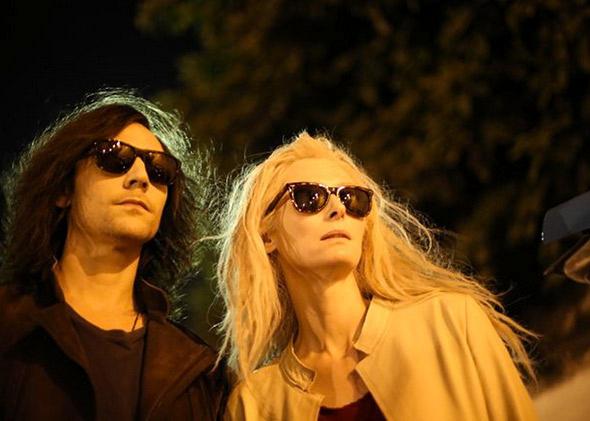Some moviegoers will see Jim Jarmusch’s new vampire film, Only Lovers Left Alive—being released nationally this Friday after a limited run in New York and L.A.—as too much like its characters: cold, distant, and technically lifeless. They will have a point. The director’s formal restraint can chafe—Stranger Than Paradise, which first won him indie fame back in 1984, cuts to black after every scene. Even his prior forays into genre—Ghost Dog’s samurai hijinks, Dead Man’s acid-western longueur—featured a compositional remove that gave the viewer little purchase. Jarmusch’s detractors condemn this preference for style over story, slamming his penchant for low-stakes narrative and long conversational passages in which nothing actually happens.
But in the case of Only Lovers’ vampires—Adam and Eve, played by Tom Hiddleston and Tilda Swinton—such complaints are rendered moot. These creatures have been around for centuries. They have nowhere to go, nothing to see, no one to meet. Rarely has Jarmusch’s style been so inherently suited to his content. Stillness and silence, the cardinal virtues of his method, have never been so pertinent as in the lives of the undead.
This is not to say that Only Lovers is some stilted exercise in technique. Jarmusch is no snob: His works may be masterfully controlled and chock full of erudite reference, but he appreciates the pulpy allure of genre. He allows his characters to succumb to vampirism’s many delicious clichés: They fixate on bleeding wounds, slake their thirsts from crimson-rimmed aperitif glasses, ask for permission to cross thresholds, admire the waxen moon. Though they cull their blood supply from hospitals and side-street doctors, for Adam and Eve exposed human flesh still screams “entrée.”
Similarities to the traditional vampire canon stop there, however. Jarmusch is fond of an old line from Jean-Luc Godard: “It’s not where you take things from, it’s where you take them to.” So where does he take his Ray Ban–clad bloodsuckers? In short, to Detroit. The bare-bones plot has Eve leave her home in Tangier, Morocco, to visit Adam in the Motor City, after a video-chat reveals the latter to be in serious need of some company.
All that sounds very dear, but this is not a conventional love story: The film’s premise is one that denies romantic development. Adam and Eve, having lived and loved for centuries, possess a rapport that does not hew to the trappings and rituals of finite human relationships. Their understanding of each other is total and comprehensive; there is nothing left for each to learn of the other, so we end up learning very little as well. The pleasure is extracted from observing them in their eternal embrace.
Thankfully, they’re interesting enough for this to work. Take Adam, who, though an ancient thing, shares the traits of an adolescent. He is angsty and brooding and petulant—a lithe musician who spends his days making ambient drone rock in dishabille. A former chum of Lord Byron and Percy Bysshe Shelley, he’s most comfortable reminiscing about his Romantic past; when that gets old, he whines about the present, bemoaning how humans continue to exalt Charles Darwin despite dismissing Nikola Tesla. In one heart-to-heart with Eve, he sulkily declares that he has no heroes.
But Jarmusch does, and they are very much the film’s women. Mia Wasikowska shines as Ava, Eve’s carefree and cavorting younger sister, whose joie de vivre and candor enliven the film’s midsection. And then there’s Swinton, who sinks those sharpened canines into every scene. Her Eve preaches a lust-for-life gospel, whispering the Latin names of local megafauna and swooning in adoration at batches of fungi. Her acting, in keeping with this wide-eyed wonder, is not performance so much as prayer: it’s as though someone is spoon-feeding her revelations before each take. At every moment, her pale skin glows and her dilated pupils flit over the nightscape in serene rapture.
These women anchor the movie, largely because the men—Adam in particular, but also an endearing guitar-dealer played by Anton Yelchin—are too flawed to see beyond themselves. (Jarmusch’s inspiration for the film, Mark Twain’s Diaries of Adam and Eve, explores a similar theme: the personalities of our biblical forebears, ascribing to Adam a surly cynicism and to Eve an innocent sense of wonder.) Jarmusch skeptics may mistake vampire Adam’s incessant odes to dead artists and thinkers as a surrogate for the director’s own high-minded nostalgia. But Only Lovers is not a lament for the way things were; it’s a paean to Eve, to a hope for the future. Swinton’s character is inspiring, her worship of the world all the more surprising because it flows not from a curious child but from a centuries-old creature of the night. She should be more jaded; she is not. She at times seems like the only lover, anywhere, who is actually alive.
